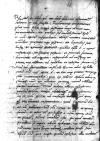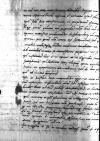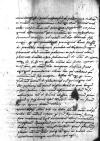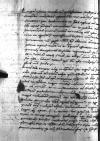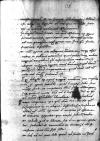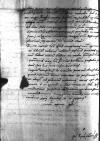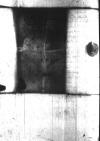Plurimae occupationes, quibus nunc solito magis distineor, immo obruor, non permittunt, ut prolixae, sed iucundissimae ⌊⌋ Dominationis Vestrae Reverendissimae respondeam, tametsi,
vacuus curis etiam omnibus, praestare vix possem, ut leporibus salibusque et eximiis doctrinis, quibus epistula Dominationis Vestrae Reverendissimae referta est, satisfacere possem, et proinde Laconica brevitate, non argutia, respondebo ad ea tantum, quae corporea aut mundana, non spiritualia et caelestia sunt.
Unum tamen praetermittere visum non est me adeo exhilaratum ⌊⌋ Vestrae Reverendissimae Dominationis, ut dici vix queat, nempe quod illa metamorphosi, qua ex telone ⌊apostolum⌋ olim a Christo, nunc ex rhetore poetaque verum Ecclesiasten factum videam. Utinam tubam illam caelestem, ⌊Paulum Apostolum⌋, audirem et agnoscerem in Dominatione Vestra Reverendissima non verba tantum et doctrinas, sed opera quoque atque contiones resonantem. Quod futurum brevi mihi polliceor, nihil enim vetat et [scir]e, et operari bonum et adeo mihi persuasit Dominatio Vestra Reverendissima otium et quietem summe iucundam esse, per qua tantum fructum se capere abunde declarat, ut mundus hic cum vita eius brevi admodum nullius pensi sit apud eam, quae raptu quodam caelestia illa meditatur
et ad ea toto vitae tenore contendit. Precor, ut Deus Omnipotens in Vestra Reverendissima Dominatione conatum istum sanctum Spiritu Sancto suo confirmet et perpetuum faciat.
Ego etiam, quamvis ante cupiebam, nunc, ⌊⌋ Vestrae Dominationis Reverendissimae accensus, vehementer desidero dari mihi occas[io]nem, per quam non iam ex sirenibus, sed ex turbis molestiisque multis aulae me evolvere et ad oviculas meas se transferre possem, ut si quando institutum hoc Dominationis Vestrae Reverendissimae et in legendis Sacris Scripturis, et in doctrina sacri eloquii opere explenda sequi et exprimere valeam, sed de hoc plus quam ab initio conceperam.
Quod dominus ⌊Kostka⌋ tam imprudenter agit, ut una nondum extincta difficultate aliam sibi assciscat, non laudo, immo ad eum scribens detestatus sum et hortatu[s], ut rectius sibi consulat, nihil esse tutius et utilius, quam amari a quam plurimis et maximis viris suasi, sed ut suspicor, non persuasi, puto tamen, quod in ⌊conventu⌋ proximo Marienburgensi faciet tandem, quod ei semel impositum est per ⌊maiestatem regiam⌋. Vestra etiam Reverendissima Dominatio adiutabit consilio suo, ne minim[e] dura exigantur ab eo.
In negotio domini ⌊Ioannis a Verden⌋, tametsi spero Dominationem Vestram Reverendissimam
iam accepisse, quod responsum dominus ⌊palatinus Culmensis⌋ a ⌊maiestate regia⌋ reportavit, tamen ego etiam paucis indicabo. Misit huc cum ⌊privigno⌋ supplicans, ut privignus conservaretur per ⌊maiestatem regiam⌋ in possessione bonorum ⌊Radzyn⌋ ad vitam cum hoc commodo fisci regii, quod ipse privignus annis singulis de proventibus Radzinensibus pendat ad thesaurum regium florenos centum vivente ⌊palatino⌋, et post eius obitum florenos ducentos esset soluturus. De Vestra Dominatione Reverendissima atque de domino ⌊Ioanne⌋ nulla mentio hic facta est. Res haec, ut nunc sunt tempora, habuit suos egregios promotores ultra hoc, q<u>od utilitas ipsa nemini non sit accepta. Effeci tamen ego, quod in praesens nihil impetravit dominus ⌊palatinus⌋ cum ⌊privigno⌋, sed certe sustinui non parum difficultatis, de qua longum esset scribere. Hoc unum affirmare possum, nisi adfuissem causae domini ⌊Ioannis⌋, abiisset m... summum privilegium, ei super bonis istis concessum. Hoc tamen in sinum Dominationis Vestrae Reverendissimae dictum velim.
Reverendissimi domini ⌊Cracoviensis episcopi⌋ obitum tuli, ut debeo, dolenti animo, sed, quoniam video non multum restare, quod eum secuturi sumus, fero moderatius legis sanctionem omnibus mortalibus impositam. Epitaphium per Vestram Dominationem Reverendissimam conscriptum habui prius ex ⌊Cracovia⌋ missum. Quod plurimum placet non mihi solum, sed iis etiam, qui et iudicio, et doctrina magis valent quam ego.
Propter istam mulierem ⌊Vosczkowa⌋ suscipio h[ic] frequenter molestias exponendo me adversus ipsiu[s] fautores, qui lacrimas et preces ipsius tam com[men]dant apud principes, ut videatur vi et potentia ad[ver]sariorum, ad quorum nutum remotumque omnia istic f[ace]rent et agerentur oppressa, ad iustitiae ministratio[nem] pervenire non posse. Nihil tamen obtinere hacten[us] potuit apud ⌊maiestatem regiam⌋ hic, quod afficeret vel prioribus decretis, vel iustitiae cognatorum domini V[er]den. Utinam tandem finis sit aliquando huic contro[ver]siae . Libenter carerem ipse etiam istis molestiis, de quibus nihil scribo etc.
Quod tanto tempore aliqui in consilium istic regium non inc[ede]runt, puto non tam eorum culpa, quam constellatione quada[m] factum esse. Nam cum ipse maxime essem de hoc so[lli]citus, ut tandem ⌊regia maiestas⌋ iuberet omnes iura[re], qui non iurar[un]t, et in instructione ad conventum ⌊Reg[ni]⌋ voluntatem perscriberem formulamque iurisiurandi litteris regiis includendam pararem, ecce amanuensis meus, relicta formula, litteras regias obsignavit et ego, putans litteris inclusam, absolvi cubicularium regium.
Cogor igitur opera Dominatioinis Vestrae Reverendissimae hoc, quicquid est inadvertentiae et erroris, corrigere. Quam rogo, ut litteras regi[as] ⌊senatoribus Prussiae⌋ inscriptas regio nuntio, nempe d[omino] ⌊Plotowski⌋,aut, eo absente, domino ⌊Tidemmanno Gisio⌋ reddi faciat senatui per eum praesentandas. In quibus est praescript[um]
iuxta quod Dominationes Vestrae iurare debebunt. Additum est aliquid in legatione contra eos, qui revelant secreta et actiones arcanas consiliariorum.
Iniungitur etiam severe, ut omnes consiliarii ex aequo ferant munia comitiorum, nec deinceps venire ad ea peragenda negligant, nec prius, quam finita fuerint, discedant.
Dominatio Vestra Reverendissima, uti assequor coniectura, neque absolvetur a publicis actionibus, quod petit, neque aulicis negotiis occupabitur, quod reformidare videtur, nisi aliqua insignis legatio eius humeris propter bonum publicum iterum imponatur. Quod etiam vel non cito, vel numquam futurum est.
Egi diligenter apud ⌊regiam maiestatem⌋ pro impendio Vestrae Dominationis Reverendissimae sarciendo, quod in nuptiis ⌊filiae⌋ suae maiestatis fecit, et impetravi, centum florenos dumtaxat, super quibus mitto litteras ad dominum ⌊Kostka⌋. Nam eo tempore, quando omnes consolabantur liberalitate regia, facilius erat impetrare 300 quam nunc 100. Ita fit, quando desuescimus in re aliqua, difficilius assuescimus oblitis etc. Vestra Reverendissima Dominatio accipiat, quod offertur, et maiora exspectet, quae occasio subministrabit. De calculo, quod ab eo liberata sit Dominatio Vestra Reverendissima, gratulor. Fabulam de eunuchis et cantheriis non refrico, dies enim festi sunt.
De litteris ad ⌊summum pontificem⌋ dabo operam, quando scivero, an priores
redditae sunt, tum de qua re et ad quem effectum scribendum erit, hoc enim non plene indicant litterae Dominationis Vestrae [Reverendissimae].
De ⌊rege Angliae⌋ mira feruntur et scribuntur ex omnibus partibus mundi. Utinam Deus eum potius detrudat ab hac sede, in qua per nequitiam suam magnum detrimentum adferre poterit, si perstabit in mal[itia] sua, religioni Christianae, regum enim exemplum plurimi sequuntur, non inviti etiam.
Pro novis habeo gratias maximas Vestrae Reverendissimae [Dominationi] et libenter talionem redderem, sed nihil penitus no[va]rum rerum habetur in aula ⌊principum⌋ nostrorum. Serenissimus ⌊rex⌋ noster iunior iuramentum praestabit su[b]ditis istis hic suis infra tres dies.
Capitur consilium de ineunda pace cum ⌊Moschis⌋, quod utinam bene vertat et perficiatur, ut aliquando ad ⌊Poloniam⌋ redeamus.
Deus Optimus Maximus servet Dominationem Vestram Reverendissimam in hac nova et sancta transmentatione perpetuo constantem et diutissime incolumem. Cuius fraterno amori me commendo.
